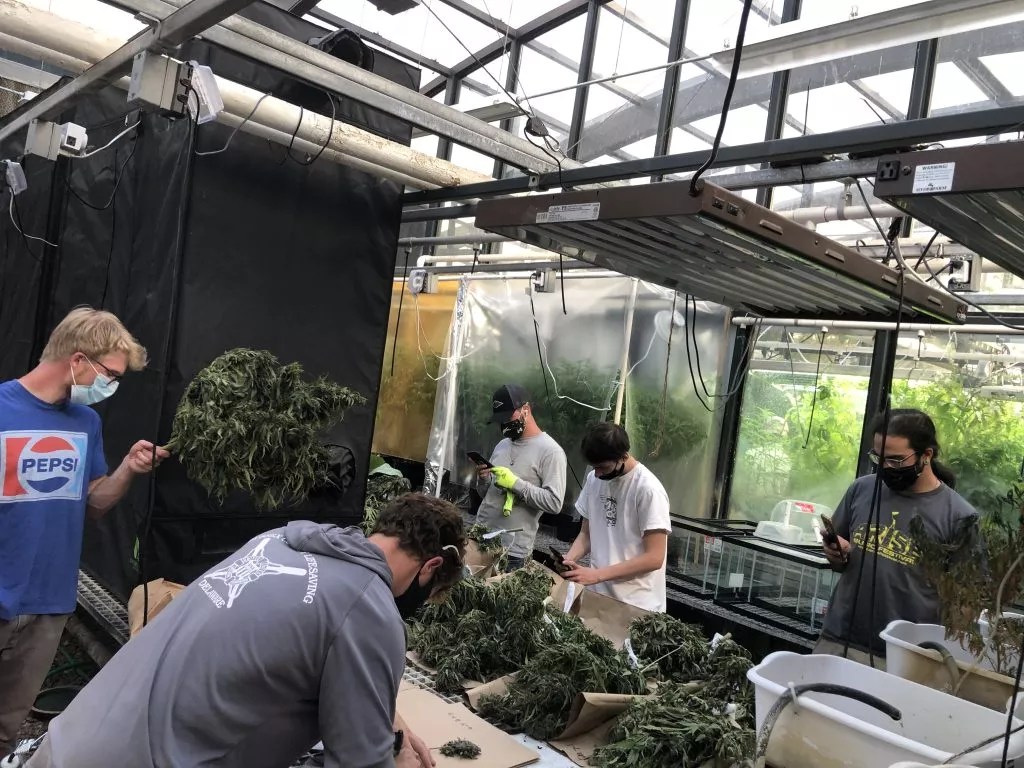
Colorado State University-Pueblo

Audio By Carbonatix
Nearly $1 million in grants has been awarded to a variety of cannabis studies taking place in Colorado, including research into impairment, cultivation efficiency, and health benefits and risks of marijuana use.
The Colorado State University-Pueblo’s Institute of Cannabis Research (ICR) announced last week that $800,000 in school grants will fund six studies at CSU and University of Colorado campuses across the state. According to the ICR, the studies are now part of twenty ongoing cannabis research projects funded by the institute, which has published forty studies on marijuana and hemp since 2018.
The ICR first opened in 2015 and is largely funded by retail marijuana tax revenue, but it didn’t have the money to support research conducted at schools outside of CSU until the pandemic ended. The more collaborative approach allows for better research and further dissemination of information, according to ICR director Chad Kelly.
The first statewide cannabis studies with state funding have been researching topics such as the prenatal impact of CBD use, medical marijuana’s effectiveness at treating post-surgery pain, and retail marijuana labeling. Those results should be ready by next year, Kelly notes, with enough funding left for the ICR to issue more grants for the next two years.
“There are a number of studies out there in which I’m very excited to see what the outcomes are. In many cases, I’m sure there will be additional research needed to carry it to the next level, but we’re really fortunate to be able to engage the best researchers throughout Colorado,” he says.
We caught up with Kelly for a rundown of the six new studies:
How CBD Impacts Children With Autism Spectrum Disorder
Led by developmental pediatrics professor Dr. Nicole Tartaglia at the CU Anschutz Medical Campus, this study will look at how CBD can influence treatment strategies for young people with autism. According to Kelly, the study will integrate that analysis with that person’s overall endocannabinoid system and their expressions after using THC, CBD or other cannabinoids. A 2017 study done in Chile found that oral cannabis extracts were “dramatically more effective than conventional medicines” at combating autism spectrum disorder, while studies in Israel have shown cannabis to improve behaviors among autistic patients. In 2019, autism became a qualified condition for medical marijuana patient status in Colorado.
Identifying Rewarding and Adverse Properties of THC Effects
Cannabis users often argue that THC isn’t scientifically addictive, and while cannabis isn’t as addictive as most recreational drugs, individuals who use it are still at risk of developing a disorder. CU-Boulder’s Dr. David Root, a professor in the Department of Psychology and Neuroscience, will head a study that studies neuronal cells and biochemistry associated with the brain’s “reward reflex” connected to addictive substances.
Kelly stresses that this rare study isn’t part of his expertise, but he’s excited about the potential findings. “This could lead researchers to better understand why some individuals demonstrate more addictive behaviors than others, specifically in this case with THC,” he explains.
Identifying New Roadside Testing for Dual Intoxication of Alcohol and Cannabis
Drivers are increasingly impaired by more than one substance nowadays, according to Colorado law enforcement and the state Department of Public Transportation. And if detecting dual intoxication wasn’t hard enough, the science behind roadside THC testing and criminal laws leaves a lot to be desired. Although this study, led by CSU’s Dr. Patti Davies and Hollis Karoly, won’t immediately change roadside testing, Kelly believes the research angle could show a more modern approach.
“It’s looking at techniques to measure impairment that might occur because of alcohol, cannabis or co-use. This is actually looking at activity in the brain and looking for a mechanism to measure impairment directly from brain activity,” he adds. “It has the potential to help address that challenge, particularly for law enforcement, in terms of assessing driving under the influence, because blood THC tests are not as reliable as they would like.”
Identifying Harmful Chemicals in Vaped Cannabis Products
This study isn’t connected to the vaping health crisis connected to black market THC products a few years back, but it could help spot harmful contents all the same – and considering that vape pens account for almost one-quarter of dispensary sales, that’s pretty important. CU Anschutz’s Dr. Alison Bauer and her team will research carcinogenic materials produced by incomplete combustion, or vaping, of organic matter.
“These are not compounds that are unique to cannabis, whether it’s looking at electronic dabbing or vaping. This is a study to understand the presence of these potentially harmful compounds,” Kelly says. “Some are identified as suspected carcinogens, but there are also concerns beyond cancer in terms of lung or cardiovascular impact.”
Examination of Interactions Between Cannabis and Gut Microbiota
Cannabis has long been used when people need to kickstart their appetites, but this study wants to learn about true medical applications for intestinal disorders. According to the ICR, CSU professors Dr. Jessica Prenni (agricultural sciences) and Dr. Tiffany Weir (food science) will partner up for research into how cannabis impacts microbial metabolism, gut barrier function and inflammatory profiles.
“Long-term outcomes of this research will provide much-needed information that can pave the way for intentional use of phytocannabinoids to treat intestinal disorders and other conditions that are linked through compromised intestinal barrier function and the microbiota-gut-brain axis,” according to the two professors.
Most Efficient Irrigation and Nutrients for Growing Cannabis
Growing cannabis for commercial purposes is all about yield, potency and time spent blooming, and the success of those factors largely depends on water and nutrients. Dr. William Bauerle, an agricultural science professor at CSU, aims to improve and optimize cannabis growing by learning which nutrients and watering methods work best in intensive environments, according to Kelly, “to ensure that you’re using the most limited resources in the most efficient way possible.”